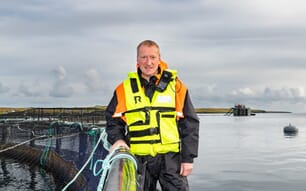With just 18 months until the new CFP’s discards ban is imposed on the whitefish fleet, concern is growing at the lack of progress in finding practical ways to implement the legislation.
Islanders believe that rules drafted by a well-funded green lobby hundreds of miles away in Brussels are ill-suited to Shetland’s highly productive fishing grounds. And that the consequences could be extremely damaging to the local community.
Simon Collins, executive officer of the Shetland Fishermen’s Association which represents fishermen in the islands, said: “The Shetland economy is heavily dependent upon fisheries, with catching and aquaculture accounting for one third of GDP – a much greater share than oil.
“There’s not one fisherman in Shetland who wants to throw away good fish, and the sooner we can eliminate discards the better.
“But the rules have to be workable, otherwise our boats will be placed in an impossible situation. Business failures would have a huge knock-on effect on a tiny island community where the options for alternative employment are extremely limited.
“We have a thriving and extremely diverse fishery here in Shetland, and we are proud of our record in fishing responsibly and sustainably.
“It was never the intention of policymakers to destroy communities like ours. We would also point out that one of the primary aims of the CFP, written into the legislation alongside the discard ban, is to generate ‘economic, social and economic benefits’.
“With so much at stake for jobs and our island life, it would be entirely proper and reasonable for the new crop of parliamentarians in Brussels to take a fresh, commonsense look at discard ban implementation.
“We all want to eliminate discards. But there is no virtue in persisting with rules that don’t work, especially when their side-effects are completely unacceptable.”
The SFA is highlighting a particular passage in new CFP which contains a clause stating: “Small offshore islands which are dependent on fishing should, where appropriate, be especially recognized and supported in order to enable them to survive and prosper.”


